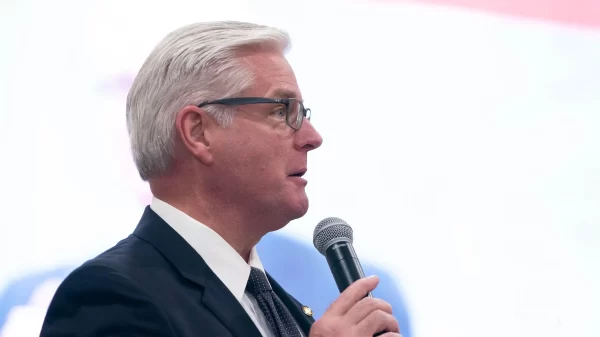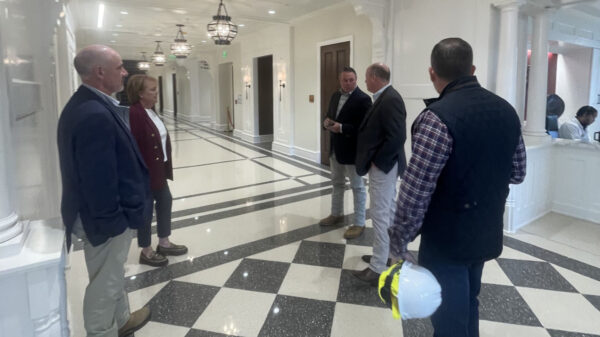One of the companies vying for millions in taxpayer dollars to build Alabama’s new prisons is owned by the ousted former CEO of one of the other four companies in the running.
That man, Tennessee businessman Doctor Robert Crants Jr., was also involved in a recent lawsuit connected to a privately owned and operated prison in Alabama, which resulted in Crants agreeing to pay back $2 million the company says he took without the company’s knowledge or approval.
Gov. Kay Ivey last week announced the five companies in the running to build one or more of three planned new prisons are: The GEO Group, Inc., Corvias, LLC, Corrections Consultants, LLC, CoreCivic, Inc. and Alabama Prison Transformation Partners.
APR first reported last week that B.L. Harbert International and Star America Infrastructures are two of the entities behind the secretive Alabama Prison Transformation Partners, but there are likely other partners. The Alabama Department of Corrections last week declined to name the the companies behind the Alabama Prison Transformation Partners, which has no online presence and does not appear to be registered in any state.
While three of other companies on the list are known entities, Corrections Consultants LLC remained a bit of a mystery as well. There is a company by that name based in Pennsylvania, and attempts last week to reach its owner were unsuccessful, but on Tuesday that owner confirmed to APR that her company hadn’t applied to build Alabama’s prisons.
A separate Corrections Consultants LLC was formed in June 2017, according to the Alabama Secretary of State’s website.
Demopolis attorney Woodford Dinning Jr. is listed as the registered agent of Corrections Consultants LLC, according to the Secretary of State’s website. Dinning told APR by phone Tuesday that while he never met Crants, he did work with some of his consultants to incorporate in Alabama in hopes of building in Demopolis at the time. That project never came to be, Dinning said.
“I just helped them with some paperwork,” Dinning said.
Ann Page is listed as director of business development for Corrections Consultants LLC on the company’s Alabama incorporation papers.
Attempts to contact Page on Tuesday were unsuccessful but her LinkdIn account states that she’s worked at Corrections Consultants since 2015 and that the company is based in the Nashville area.
Tennessee’s Secretary of State’s website lists Corrections Consultants LLC as having last formed in 2015.
In 2017 an address change for the company listed a physical address of 1310 Chickering Road in Nashville, which is the $4.5 million home of Nashville businessman Doctor Robert Crants Jr., according to property tax records. (Doctor is his legal name from birth, but Crants has gone by Robert throughout his adulthood.)
The records change on the Tennessee Secretary of State’s website in 2017 also changed the name of the registered agent of Corrections Consultants from “Doctor” to “Shirley”. Crants is married to Shirley Crants, according to court records.
Crants was one of the three co-founders of Corrections Corporation of America, which was founded in Tennessee in 1983 and later changed its name to CoreCivic following a series of lawsuits over prisoner abuse, prison riots and escapes.
CoreCivic is the second largest private prisons and immigrant detention company in the U.S. and is one of the five hoping to land Alabama’s new prison contracts.
Attempts to find contact information for Crants were unsuccessful Tuesday.
Crants was terminated from his CEO position at Corrections Corporation of America (CCA) in 2001, according to the company’s press release, which stated the move was part of a “corporate restructuring” plan.
In 1999 CCA reported a net loss of $203 million, according to Prison Legal News. The loss followed the company’s formation in 1997 of a seperate operating company, Prison Realty Trust Inc., which exempted the company from federal corporate income taxes.
The move had disastrous results, however, and Prison Realty Trust defaulted on its debts. CCA’s stock dropped to below $1 a share, according to news accounts, and shareholders filed lawsuits. Crants was terminated in 2001.
Shortly after the Sept. 11 terrorist attacks Crants formed a new company, Homeland Security Corporation, which sought federal contracts to train baggage handlers and air marshals.
A former partner in that business, Bruce Siddle, sued Crants in 2008 alleging Crants and other defendants stole more than $1 billion out of the company. A federal judge in 2010 tossed the suit and ruled that Siddle had signed releases that covered the defendants’ actions, according to the Nashville Post. In 2013 the judged ordered Siddle to pay Crants $1.5 million for attorney’s fees.
An Alabama connection, lawsuit
In January 2018 Louisiana-based LCS Corrections Services and a law firm connected to the company’s chairman of the board filed a civil suit in the U.S. District Court for the Middle District of Tennessee against Crants alleging that he transferred and spent $2 million from the company through a bond deal without the company’s knowledge.
LCS Corrections Services had previously managed and operated the Perry County Detention Center in Uniontown, AL as well as seven other facilities in Louisiana and Texas.
Crants became a board member and director of LCS Corrections Services in August 2011, according to the suit, which alleged that he immediately began taking loans for personal expenses, which by 2013 totaled $1.5 million.
In 2013 the chairman of the board at LCS Corrections Services began the process of refinancing the company’s bonds, and without the company’s knowledge Crants requested directly to the underwriter that he and another board member, who was appointed alongside Crants, be paid a $2 million fee through that bond deal, the suit alleges.
Crants withheld any knowledge of that $2 million fee from the company, and LCS Corrections Services only learned of it “approximately one minute before the deadline for the closing of the bond transaction,” according to the complaint.
The money was paid to LCS Holdings, which Crants controlled, the suit alleges, and Crants and his wife “used the $2 million fee for their personal and family purposes and for Crants’ business purposes and spent the entire $2 million fee.”
Crants refused to repay the $2 million and the company in January 2014 removed him from the board and asked that he also repay $1.5 million in outstanding loan debt, according to the complaint.
A law firm connected the chairman of the board of LCS Corrections Services filed suit in a Florida court in 2014 to recoup that $1.5 million from Crants in unpaid loans and interest, and in 2016 a judge ordered Crants to pay $1.7 million.
U.S. District Judge Eli Richardson on March 22, 2019, entered a final judgement in the Tennessee case and approved a settlement agreement in which Crants is to repay $2 million to the plaintiffs, according to court records.
In 2015 Geo Group bought the Perry County Detention Center from LCS Corrections Services as part of a $312 million deal to buy all eight of the company’s facilities in Louisiana, Texas and Alabama.
In 2009 two inmates serving sentences for murder and attempted murder escaped the Uniontown facility through a hole cut in fencing. The two were later wounded and recaptured in a shootout with police in North Dakota, and seven workers at the facility were fired, according to news accounts.
In 2009 Vermont pulled the state’s 80 prisoners out of the Perry County Detention Center following reports of violence among inmates due in part to understaffing, according to news accounts.
Alabama housed 448 inmates at the Perry County Detention Center in 2011, according to Alabama Department of Corrections statistics. In 2012 the number of state inmates held there dropped to seven, according to the department’s statistics.
Crants tries in California
In 2014 the city council in Adelanto, California considered a proposal by Crants and his LCS Holdings LLC to build a 3,264-bed prison to accommodate Los Angeles County’s inmate overflow, according to the San Bernandino Sun.
The Adelanto City Council later approved of Crants’ proposal to build the prison, but according to The Daily Press Crants had to gain approval from L.A. County before buying the land where the prison was to be built.L.A. County supervisors wouldn’t pass off on the project, however, in December 2015 The Daily News reported that the project was dead.
LCS Holdings LLC became inactive in August, according to the Tennessee Secretary of State’s website.
While APR was able to identify the businessman behind Corrections Consultants and two of the business behind the Alabama Prison Transformation Partners, others connected to that partnership likely remain unknown, and the state Department of Corrections isn’t saying.
In a statement to AL.com last week ADOC declined to give any information about those companies, saying in a statement that the department promised to keep all information private until contracts have been finalized.
Asked by APR on Tuesday what state law the ADOC claims gives the department the right to keep names of these companies private, the department declined to mention any such law, and instead sent the same statement sent to reporters last week.
“Integrity and fairness has been, and will continue to be, of the utmost importance throughout the procurement process. The Request for Qualifications assures competing developers that “any information received in response to the solicitation/request will not be publicly available until final contract(s) has received all approvals.”
“To protect the integrity of the competitive selection process and to avoid inviting outside influence or legal challenges, the Alabama Department of Corrections cannot release information contained in the respondents’ Statements of Qualifications.”
The state has estimated the cost to build the three new prisons at $900 million.



















































